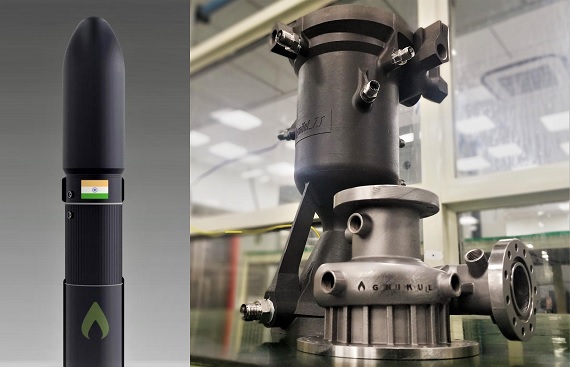Agnikul Secures US Patent for World's First Fully 3D-Printed Single-Piece Rocket Engine
By
siliconindia | Thursday, 07 August 2025, 11:27 Hrs

- Agnikul Cosmos has developed the world’s first fully 3D-printed, single-piece rocket engine using Inconel superalloy with no joints, welds, or fasteners.
- The startup secured a US patent for this revolutionary engine design and manufacturing process, marking a rare international IP win for Indian space tech.
- This innovation reduces production time by 60% and boosts efficiency, strengthening India’s position in the global private space race with backing from ISRO and IN-SPACe.
In a groundbreaking achievement for India’s private space sector, Chennai-based space tech startup Agnikul Cosmos has developed the world’s largest single-piece 3D-printed rocket engine a pioneering innovation that has now earned a US patent. The engine, manufactured entirely from Inconel, a high-performance nickel-chromium-based superalloy, is printed as a single integrated unit, without a single weld, joint, or fastener from fuel entry to plume exit.
The engine measures approximately a meter in length and was created using additive manufacturing technology, pushing the boundaries of traditional rocketry. The fully integrated design reduces production time by over 60%, minimizes failure points, and improves engine performance through optimized fluid flow. The breakthrough not only simplifies the manufacturing process but also significantly enhances the engine’s durability and thermal resistance, thanks to the robust properties of Inconel.
What sets this achievement apart is the US patent granted for both the design and manufacturing process of this engine. This gives Agnikul exclusive rights in one of the most competitive space technology markets, protecting the company’s innovation from being copied or commercialized without authorization. It’s a rare distinction for an Indian-origin design, placing Agnikul at the global forefront of 3D-printed rocket propulsion.
“This is not just a technical milestone but a strategic win”, said a spokesperson for Agnikul. “Being granted a US patent reinforces the originality of our work and strengthens our position in global aerospace manufacturing”.
The success of this initiative is deeply rooted in the support of India’s space ecosystem, including collaborations with ISRO, INSPACe, and Wipro 3D, as well as backing from key government bodies like the Department of Science and Technology (DST) and the Technology Development Board (TDB). These partnerships have enabled Agnikul to not only innovate but also scale effectively.
With this achievement, Agnikul continues to push forward its vision of democratizing space access and making rocket production faster, safer, and more cost-effective. The patented engine will play a critical role in powering Agnibaan, the company’s customizable launch vehicle aimed at delivering small satellites to low-Earth orbit.
As the global space race intensifies, Agnikul’s patent-protected innovation signals a new era for Indian aerospace, establishing India not just as a participant but a serious contender in next-generation space propulsion technology.

